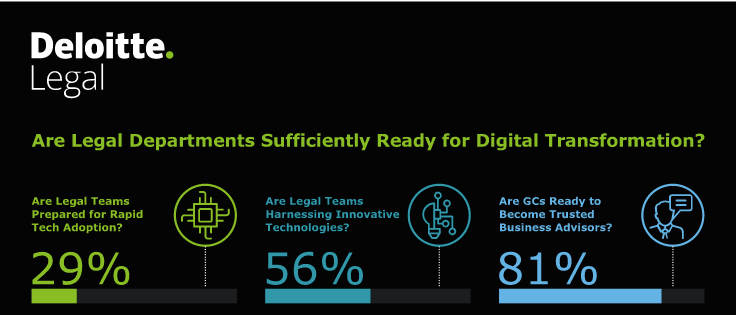Digital disruption for law firms can come from anywhere; for instance, in the legal sector, disruption is brought by companies like LawDingo, which offers a platform for consumers to find professional legal services and bid for the legal work they need to get done.
Similarly, Clearspire and Axiom are proving that a lot of clients today are moving from traditional to new ways in order to gain value. Technology and new working models that were once exclusive to the IT sector now empower legal professionals to deliver excellent services.
Gone are the days when a law firm’s competitors were other law firms. Today, a new competition has emerged between attorneys and technology. With artificial intelligence (AI) and machine learning (ML) developing rapidly, the rising gig economy, and the client-centric era, attorneys need to adapt to the changing world around them to become competitive and relevant.
What’s New in The Legal Industry?
Legal, despite being a highly regulated industry, is not experiencing disruption for the first time. However, the new disruption is the emerging need for new business models that bill on value instead of time.
Attorneys and law firms can take advantage of this opportunity through technology. As clients will always seek value, they are embracing new service models such as inshoring, offshoring, outsourcing, and in-housing for skilled experts to handle business areas that are at high risk.
Law firms providing various services are now losing cross-sell opportunities to highly cost-effective alternatives clients are aware of. Additionally, market drivers are rapidly adopting technology and taking new approaches to delivering valuable legal support services.
The emergence of mobile technology has introduced a whole new area concerning security awareness. Since law firms hold a massive amount of personal and sensitive data of their clients, they often experience security breaches, and the numbers are increasing. (Source)
New Technological Advancements are Disrupting Legal Services
Law firm operations are expected to be influenced by the latest technology developments and new demands from today’s clients. Software tools and applications are helping law firms manage processes faster, effectively, and securely. These are also replacing labor-intensive functions with virtual processes.
Moreover, clients expect the best digital experiences. This includes virtual communication, mobile-first solutions, more control over their legal cases, speedy and effective resolution, etc. Given that, law firms need to be updated about the fast-changing technology landscape in order to satisfy their clients.
The utilization of AI and ML will have an impact on various legal areas. By 2036, 100,000 jobs are likely to be automated, according to one report by Deloitte. Therefore, now is the time for law firms to bring change, embrace AI, and employ legal tech experts to improve internal processes and future-proof themselves.
Also Read: Data Breach Litigation Preparation: What Measures Law firms Need To Consider?
1) Threats Arisen Out of the Growing Gig Economy
Digital disruption has changed the way attorneys work. Today’s young legal professionals demand workplace flexibility and prefer performance evaluation based on results rather than office attendance. Law firms that recently entered the sector have already adopted an open-minded work culture that promotes staff productivity, loyalty, and growth.
The gig economy can also significantly influence the legal sector; professionals can choose their preferred location and time to work. Platform lawyers typically use digital tools to work remotely and can market their practice the way they want. Due to low operational costs and lower service charges than traditional firms, they can increase profits quickly.
Law firms refusing to adopt new work cultures will experience challenges in finding and retaining talent, boosting productivity, and encouraging their staff.
2) Getting Opportunities Out of Threats
Some positive aspects of the digital disruption and having platform attorneys go unnoticed by law firms that are too busy managing their workload. Automating tedious, repetitive tasks and allowing staff to work remotely gives several opportunities to law firms.
Although attorneys might be concerned about the reduced billable hours due to the automation of most paper-based legal processes, they will get more time to handle more important work they might be more interested in doing.
Digital disruption is here not to threaten the legal landscape but to challenge it. Clients now demand a whole new level of experience, specially tailored as per their unique requirements.
Law firms need to take client-centric approaches to raise their game and become more competitive. This will help them retain their client base and prevent losing their clients to platform attorneys. Firms that are reluctant to adjust to the legal business’s new reality are at the highest risk.
3) Adoption of New Ways of Working
Law firms can use technology to:
- Focus on smarter and flexible resourcing
- Improve process management
- Enhance operational efficiencies
- Deliver quality legal services
4) The Required Digital Mindset
The adoption of a distributed team model and flexible working enables law firms to take a faster route toward growth. Using automation and AI to streamline processes can bring diverse income opportunities by ensuring complete accuracy (eliminating human error) and redeploying skilled staff to activities that generate higher value.
(Source)
5) New Ways for Targeting The Right Market
Digital technology and countless web tools bring many opportunities for law firms to connect with the market, also on their own terms.
They can prepare content market strategies. This can integrate the numerous channels across the web, such as their website, email, and social media handles, to drive enough traffic.
The only catch is that they need to learn where and how to play. More likes, shares, retweets, and reposts help gain the market’s trust and build a brand’s reputation.
Conclusion
A lot of law firms embrace ‘Legal -Tech,’ and many of them acknowledge the challenges it poses to information management and security, especially when it comes to clients’ highly sensitive information. Law firms need to have a demonstrated commitment to investing in data management and security systems.
They need to implement technology in communication, staff collaboration, and all legal processes that can be streamlined with tech. This will result in more projects getting completed, taking less turnaround time.
Law firms successfully doing this will increase client satisfaction and be ready for further technology disruptions. This can lead to enhanced efficiencies and gaining a competitive advantage over their peers.
Recommended Post:
What Steps Your Law Firm Will Take After Covid-19 for Firm’s Growth?




